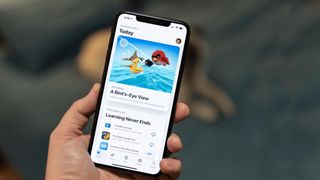Antitrust probe accuses Apple of favoring its own apps over others
Another antitrust battle looms.

Apple once again finds itself on the receiving end of an investigation over the way its App Store functions. This time it's Italian authorities investigating how it handles privacy.
Italy’s competition authority, the Autorità Garante della Concorrenza e del Mercato (AGCM), claims that Apple applied more stringent rules to third-party apps than it does its own.
The same watchdog also believes that Apple requires that apps from third-party developers use more prompts to ask for consent to handle data than it does for its own apps.
Double standards
This all relates to App Tracking Transparency, or ATT. App Tracking Transparency requires that apps ask a user's permission before they can collect data on users that could then be used to keep tabs on their activities between apps.
The Italian watchdog claims that the wording of prompts used by third-party developers is stronger than that of Apple's own apps, reports Forbes (opens in new tab).
"The watchdog said the double standard, which has been in place since April 2021, means users of non-Apple apps receive more prominent prompts needed to secure consent for data tracking from third-party developers than it does from Apple’s products," the report notes. "Third-party app developers are also less able to profile users and monitor the success of ad campaigns than Apple as the tech giant gives them access to less comprehensive tools—that give less information—than it uses itself, AGCM said."
For its part, Apple told Forbes that its ATT rules have received strong support from regulators and “apply equally to all developers," including itself.
Apple argues that ATT helps put people in control of what data is collected on them, but critics say that it prevents important data points from being used to help provide targeted ads. However, a recent report suggests that the impact on ad businesses hasn't been quite as catastrophic as first feared.
Get more iMore in your inbox!
Our news, reviews, opinions, and easy to follow guides can turn any iPhone owner into an Apple aficionado

Oliver Haslam has written about Apple and the wider technology business for more than a decade with bylines on How-To Geek, PC Mag, iDownloadBlog, and many more. He has also been published in print for Macworld, including cover stories. At iMore, Oliver is involved in daily news coverage and, not being short of opinions, has been known to 'explain' those thoughts in more detail, too.
Having grown up using PCs and spending far too much money on graphics card and flashy RAM, Oliver switched to the Mac with a G5 iMac and hasn't looked back. Since then he's seen the growth of the smartphone world, backed by iPhone, and new product categories come and go. Current expertise includes iOS, macOS, streaming services, and pretty much anything that has a battery or plugs into a wall. Oliver also covers mobile gaming for iMore, with Apple Arcade a particular focus. He's been gaming since the Atari 2600 days and still struggles to comprehend the fact he can play console quality titles on his pocket computer.
-
Just_Me_D SMH… let’s look at this from a different perspective. It’s “my” App Store and I have the right to promote “my” products and services in a greater light than yours. If I go to “your” website, I’m sure you would be promoting “your” products and services over your competitors’.Reply
If you want to harvest data from customers, create your own App Store. ;) -
FFR Another way to look at it, is apple users are favoring apples apps over the competition due to apples strong privacy features. Don’t think they can hold apple legally responsible for that.Reply
Cry harder Italian advertising firms that want to turn back time and harvest user data…. or there is always android.